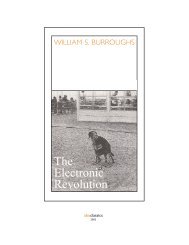Franco ''Bifo'' Berardi - The Soul at Work From Alienation to Autonomy
Franco ''Bifo'' Berardi - The Soul at Work From Alienation to Autonomy
Franco ''Bifo'' Berardi - The Soul at Work From Alienation to Autonomy
You also want an ePaper? Increase the reach of your titles
YUMPU automatically turns print PDFs into web optimized ePapers that Google loves.
m<strong>at</strong>ter th<strong>at</strong> is important for us: the vitality of the philosophical<br />
notion of alien<strong>at</strong>ion and its exhaustion during the his<strong>to</strong>rical and<br />
political b<strong>at</strong>tles of the 1960s. Alien<strong>at</strong>ion is considered by the existentialist<br />
formul<strong>at</strong>ions as an unavoidable and constitutive element<br />
of the human condition, since otherness (condition of the social<br />
rel<strong>at</strong>ion) and reific<strong>at</strong>ion (condition of the productive rel<strong>at</strong>ion) both<br />
become an unwitting apologist fo r the st<strong>at</strong>us quo. Arguing as<br />
SarrIe 1<br />
d'd th<strong>at</strong> men chose their f<strong>at</strong>e, even if it was a homble<br />
one, was monstrous [ ... J. To Marcuse, the entire project of an<br />
'existentialist' philosophy without an a priori idea of essence<br />
'bl ",<br />
was impOSSl e.<br />
imply a loss of self. In the social rel<strong>at</strong>ion, in the presence of otherness,<br />
is implicit a certain form of alien<strong>at</strong>ion, of uneasiness. Lenfer<br />
c'est les autres (Hell is other people), declares Existentialism. <strong>The</strong><br />
others are the hell of alien<strong>at</strong>ion, independently from the social condition<br />
we are living in.<br />
Hegel, Marx, and the Frankfurt School, on the other hand,<br />
share the belief th<strong>at</strong> alien<strong>at</strong>ion is not on<strong>to</strong>logically identified with<br />
otherness and reific<strong>at</strong>ion, but constitutes instead a his<strong>to</strong>rically<br />
determined form, and therefore it is possible <strong>to</strong> overcome it<br />
his<strong>to</strong>rically.<br />
On this m<strong>at</strong>ter, in his book on the Frankfurt School entitled<br />
<strong>The</strong> Dialectical Imagin<strong>at</strong>ion, Marrin Jay wrote:<br />
"To Marcuse, Sarrre had erroneously made absurdity in<strong>to</strong> an<br />
on<strong>to</strong>logical r<strong>at</strong>her than a his<strong>to</strong>rical condition. As a result, he<br />
fell back in<strong>to</strong> an idealistic internaliz<strong>at</strong>ion of freedom as something<br />
opposed <strong>to</strong> the outside, heteronomous world. Despite<br />
his avowed revolutionary intentions, his politics and his<br />
philosophy were <strong>to</strong>tally <strong>at</strong> odds. By loc<strong>at</strong>ing freedom in the<br />
pour-soi could become en-soi (being-in-itself, or an-sieh),<br />
Same severed subjectivity from objectivity in a way th<strong>at</strong><br />
denied reconcili<strong>at</strong>ion even as a u<strong>to</strong>pian possibility. Moreover,<br />
by overemphasizing the freedom of the subject and ignoring<br />
the constraints produced by his<strong>to</strong>rical condition, Same had<br />
In Reason and Revolution, one of Herbert Marcuse's most important<br />
textS, we read:<br />
"<strong>The</strong> worker alien<strong>at</strong>ed from his product is <strong>at</strong> the same time<br />
alien<strong>at</strong>ed from himself. His labor itself becomes no longer his<br />
own, and the fact th<strong>at</strong> it becomes the property of another<br />
bespeaks an expropri<strong>at</strong>ion th<strong>at</strong> <strong>to</strong>uches the very essence of<br />
man. Labor in its true form is a medium fo r man's true selffulfillment,<br />
for the full development of his potentialities.""<br />
Here Marcuse links two vety different <strong>to</strong>pics as if they were the<br />
same one: the development of potentialities (concretely detetmined<br />
in the social and technical his<strong>to</strong>ty of the conflict between workers<br />
and capital) and human self-tealiz<strong>at</strong>ion.<br />
.<br />
<strong>The</strong> first is a m<strong>at</strong>erial and precise issue, while the second IS<br />
instead a quintessentially idealistic, essentialist issue.<br />
On the conttary, according <strong>to</strong> wh<strong>at</strong> S<strong>at</strong>tre maintains in his<br />
Critique of Dialectical Reason, alien<strong>at</strong>ion is nothing other than the<br />
intrinsic modality of a1terity, which is the constitutive form of the<br />
social rel<strong>at</strong>ion and human condition.<br />
While Marcuse considets alien<strong>at</strong>ion as a his<strong>to</strong>rical form th<strong>at</strong><br />
could be ovetcome his<strong>to</strong>rically, Sartre wantS <strong>to</strong> ground anthropologically<br />
the his<strong>to</strong>ric condition itself: he loc<strong>at</strong>es his<strong>to</strong>ry's<br />
anth<strong>to</strong>pological roots in sc<strong>at</strong>city and alterity.<br />
42 I <strong>The</strong> <strong>Soul</strong> 2.t <strong>Work</strong><br />
Labor and Alien<strong>at</strong>ion in the philosophy of the 1960s / 43




